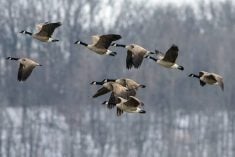Ottawa and Regina have announced $200,000 in funding to help the Saskatchewan hog industry deal with potential cases of porcine epidemic diarrhea.
SaskPork will match that to establish a $400,000 contingency fund.
No cases have been confirmed in the province, but the fund will be in place to help offset costs of disease containment, mortality management, welfare and marketing should the disease be found.
Federal agriculture minister Gerry Ritz said vigilance is key to reducing the impact of PED.
“This investment will help the Saskatchewan pork industry take proactive measures to stay in front of this disease,” he said in a news release.
Read Also

Women who fed a nation
More than 40,000 young women supported the war effort between the 1940s and early 1950s, helping grow and harvest crops amid labour shortages. They were called Farmerettes.
Provincial agriculture minister Lyle Stewart said on-farm biosecurity is critical.
“This funding will enable producers to work with their local veterinarian and marketing agencies to contain PED, locate alternate markets for PED positive pigs and ultimately minimize the spread of the disease in Saskatchewan,” he said.
Saskatchewan has 119 producers who produce 2.2 million market hogs a year from 91,000 sows.
PED is a notifiable disease in Saskatchewan. Laboratories must report positive tests within 24 hours to the province’s chief veterinary officer.
The provincial government also has a biosecurity program, which offers $150,000 to producers to improve biosecurity, including $300 for on-site veterinary assessments and $1,000 for changes to improve biosecurity measures. Trucking companies are also able to access $500 for biosecurity audits of wash facilities.
In addition, the province has committed $90,000 for PED surveillance at high-risk sites such as assembly yards, abattoirs, renderers and truck facilities.
SaskPork general manager Neil Ketilson said the entire industry has been working to prevent PED from becoming an issue in the province and is pleased to see the government match its funding.















